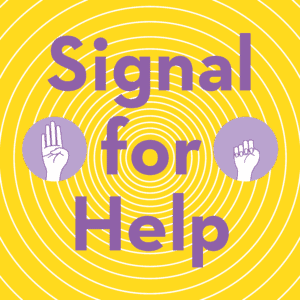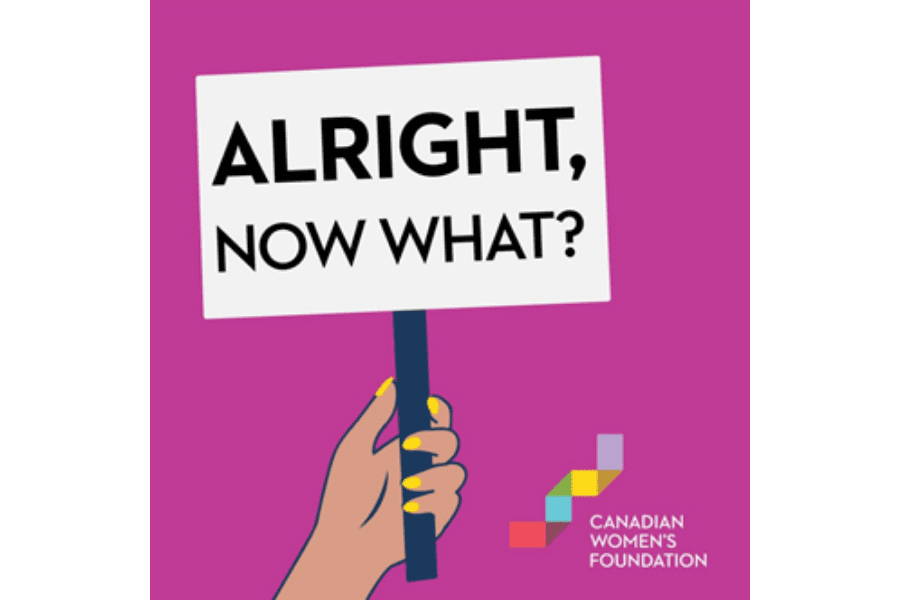 Welcome to Signal for Help, a special podcast series from the Canadian Women’s Foundation and award-winning women journalists, Media Girlfriends.
Welcome to Signal for Help, a special podcast series from the Canadian Women’s Foundation and award-winning women journalists, Media Girlfriends.
We know that gender-based violence is a problem, and we want to support survivors in our lives, but there’s a lot of stigma and silence around gender-based violence in our society: too many people who experience abuse are shamed, silenced, and stigmatized, and too many people don’t feel confident and competent in supporting them.
Featuring interviews with survivors and experts, we’ll explore how everyday people can better support survivors of gender-based violence.
Listen wherever you get your podcast content. This podcast includes stories of gender-based violence. Please listen with care.
Sherrie: What finally made me leave – Episode 6 (April 24)
In this final episode, we meet Sherrie, a survivor of intimate partner violence who has so much wisdom to share. Her story is one of family, faith, and what can happen when the institutions we trust fail us. Sherrie and her four children suffered control and abuse for years at the hands of her ex-husband. She attempted to leave the relationship many times, eventually doing so after two particularly difficult experiences involving her children and the final realization that her ex-husband “won't lift a finger to help me, not even when I am in serious need of help. He would let me die.” Now free, she uses her experience to power her life’s work supporting immigrant and refugee women in Winnipeg impacted by violence. Her biggest message: there are many ways we can offer support, but we can’t force someone to leave an abusive relationship. That decision is always for the survivor to make.
Brandi: A personal mission to report on MMIWG – Episode 5 (April 17)
Listen. Stay open without judgment or advice. Focus on what they need. These are just a few ways we can better support survivors, as we learn this week from Brandi Morin, a Cree/Iroquois/French award-winning journalist and bestselling author from Treaty 6 territory in Alberta. Brandi speaks from first-hand experience as a survivor of the Missing and Murdered Indigenous Women and Girls (MMIWG) crisis. As a pre-teen, she was sexually assaulted and held for a week by a group of unknown men. She later recounted her experience to a counselor at her group home only to be met with blame. Her experience propelled her into a life of writing, bearing witness to others who have suffered trauma. Today, she specializes in sharing Indigenous stories, including her own in her memoir, Our Voice of Fire: A Memoir of a Warrior Rising. Brandi’s story reminds us how important it is to respond well to disclosures of abuse — so we can avoid more harm and help survivors heal.
Yasmin & Taghreed: We are the frontlines – Episode 4 (April 10)
This week, we’re joined by two guests: Yasmin and Taghreed, colleagues at the Muslim Resource Centre for Social Support & Integration. They’re based in London, Ontario, a city that has experienced a traumatic Islamophobic attack in recent years. Yasmin was originally working with Muslim youth, addressing gendered Islamophobia and various social issues. When the pandemic happened, she asked, “How are your moms?” From there, Yasmin and Taghreed co-created a peer-to-peer program for newcomer women to Canada. It’s delivered over Zoom in English, with Arabic translation, with curriculum focused on recognizing signs of abuse and providing support. Program participants are extremely dedicated – and nearly 100 strong to date. Together, Yasmin and Taghreed have a simple goal: to empower community members, particularly newcomer women in the unique challenges they face. Because systems alone won’t solve the problem of abuse – it’s the community that will be the key.
Bernadette: Call it abuse – Episode 3 (April 3)
Bernadette has always been drawn to helping people. And now, that’s exactly what she does living and working in Halifax as a court advocate for women fleeing abusive relationships. This work is personal for Bernadette. She grew up in a “dysfunctional” home where she suffered corporal punishment at the hands of her father. Then, in her early 20s, she met her now ex-husband, who abused her throughout their 29-year relationship. This included physical abuse during her pregnancy, as well as enduring emotional abuse such as control and belittlement. She felt that friends and family minimized her experience, and she had to find her own way out of the marriage. Today, she often experiences minimizing language and rationale coming from those who are tasked with deciding the fate of her clients. To help, Bernadette emphasizes the importance of validating survivor voices and educating responders with the right language to go along with a deeper level of empathy.
Ruby: If I can help just one person – Episode 2 (March 27)
This week, we meet Ruby – a strong advocate for the work of the Canadian Women’s Foundation. Ruby is based in Toronto, with a young daughter, a loving family, and strong ties to her South Asian community. She is also the survivor of physical, emotional, and “all forms of violence” experienced at the hands of her ex-husband while living with him and his family. She describes her ex-husband’s family as complicit in the abuse, which left her feeling isolated and helpless even though she was surrounded by people. She describes the shame she carried – for her “choice” in the relationship, and for the times she left and returned. And, she describes her final exit alongside her family and the court systems, all motivated by her fierce love and protection for her daughter. Now that she has experienced support and accessed resources available to her, she wants others to know that there is hope.
Eternity: Listen without judgement – Episode 1 (March 20)
Statistically, girls and gender-diverse young people face high rates of intimate partner violence — rates more than double what women aged 25 to 44 experience, and more than six times higher than what women aged 65 or older experience, according to one national survey.
Eternity Martis knows these statistics well, as an award-winning journalist, author, and assistant professor of journalism at Toronto Metropolitan University. Her 2020 memoir, They Said This Would Be Fun spotlights her experiences being a student of colour on a predominantly white campus, while also being with an abusive boyfriend.
This episode focuses on Eternity’s first-person account of navigating university life while navigating her abusive relationship. She speaks about being let down by the university, struggling with her studies, and finally finding a way out. Eternity’s story also touches on the way race factors into intimate partner violence.
Now, as an educator who interacts with young people, she has many thoughts on helping students and young people who are faced with the same dilemma.
This project has been funded by Women and Gender Equality Canada.

 Welcome to Signal for Help, a special podcast series from the Canadian Women’s Foundation and award-winning women journalists, Media Girlfriends.
Welcome to Signal for Help, a special podcast series from the Canadian Women’s Foundation and award-winning women journalists, Media Girlfriends.


